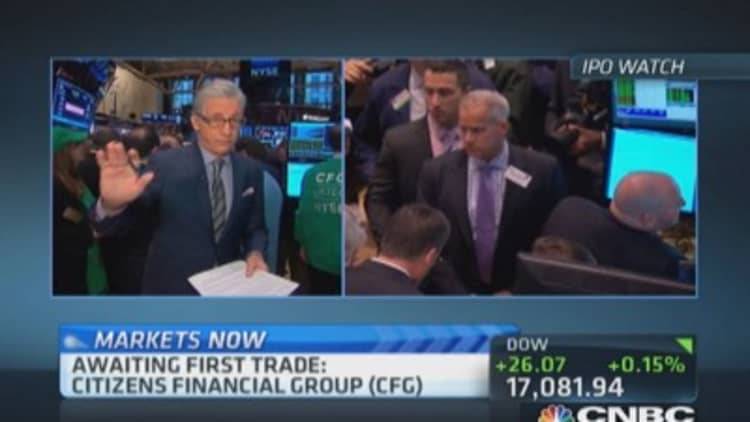I said last week that the real test for the initial public offering (IPO) market would be the ability to absorb the more than $7 billion in IPOs and secondaries coming this week in the wake of Alibaba.
Well, the early results are in, and they are decidedly mixed. Two of the four IPOs priced this week have done so below the expected range. Consider the following:

1) Citizens Financial Group, the 13th biggest bank in the U.S., priced its IPO at $21.50, well below the price talk of $23–$25; at $3 billion, this was the second largest IPO of the year;
2) Smart & Final Stores (SFS), a high-end food retailer, priced 13.4 million shares at $12, at the low end of the $12 to $14 range;
3) Medley Management, an asset management firm, priced six million shares at $18, below the $20 to $22 price talk; and
4) CyberArk, an Israeli cyber-security company, was the sole winner. The firm priced 5.4 million shares at $16, well above the price talk of $13–$15.
What happened? What happened was the underwriters are trying to price the deals high, the buyers are pushing back, and the underwriters are being forced to reduce the prices.
Does this mean the IPO market is not working? No, it means that fundamentals do matter, and that prices are becoming more rational. A price reduction does not mean a deal will fail.
On the contrary, pricing Citizens at, say $21.50 instead of $23 will if anything ensure that a deal price will hold.
The bottom line: we are pressing hard on the IPO market. There are a lot of filings in the pipeline, and this will serve notice that underwriters need to price to the market. It is a bifurcated market, for the most part.
On a separate note, there are eight secondaries that priced in addition to the four IPOs.
A little color on Citizens Financial: it was acquired by RBS Group in 1988. They operate in 11 states in the Northeast and Midwest. With $130 billion in assets, it is the among the largest banks in the U.S.
At $21.50, that price appears to be below tangible book value, according to Sterne Agee. U.S. super-regional banks, by contrast, trade at 1.4 times tangible book value. Why the lower valuation? Sub-par returns. RBS has likely been preoccupied with their European issues.
Citizens, by the way, will get no money from the proceeds.
IPO watchers will likely brush off the below-par pricing of Citizens and focus instead on CyberArk. We have not seen a tech deal in a while, and the success of this one follows the last one by MobilEye, another Israeli firm that specializes in collision detection and debuted way back on July 31, priced at $25. Currently, the stock is up 91 percent.
Elsewhere
Hess Midstream (HESM) announced its IPO. This is Hess's exploration and production company and will represent a limited partner interest in a Master Limited Partnership (MLP), which pays out almost all its cash flow in distributions.


